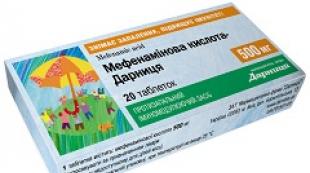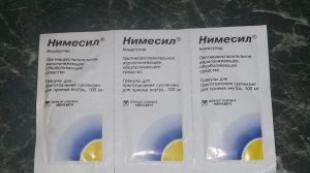Do the armies add bromine to soldiers' food? Bromine: why was it given to soldiers in the Soviet army
For many decades, boys have been taught from childhood that the army is a school of life, the best way to learn to be a real man, to easily overcome any difficulties, etc. However, not everyone is looking forward to the moment of conscription with joyful impatience, realizing that for at least a year, which they will spend in military service, they will have to completely change their usual way of life and deny themselves many things. Not least on the list of forbidden joys are close relationships with ladies. And this, as you understand, is very important for any normal young man, and it’s not easy for him to forget about sex for such a long time.
Back in Soviet times, there was a rumor that the army used bromine to reduce potency in men. The powder of this trace element is supposedly added to tea, and by drinking it, the unsuspecting soldier stops thinking about everything related to sex. And if a person is not distracted by such “nonsense”, he clearly focuses on his military duties.
Years have passed, a lot has changed, but the theory of bromine is still alive and is a subject of undisguised concern. After all, it’s no secret that this substance can cause irreparable harm to health, and some conscripts are not even sure that after such a test of strength they will be capable of procreation. In a word, there is something to think about... Let's figure out whether bromine is added to food in the army, and how it can affect a man's body.
Since the Soviet era and until now, many are convinced that bromine is added to soldiers’ food in the army to reduce potency and sexual desire. In fact, once you understand the effect of this microelement on the human body, the unfoundedness of these rumors becomes clear.
What is bromine and how does it affect the body?
Bromine is one of the halogens and is a strong oxidizing agent. It can be found almost everywhere in the environment, but salts of this element are especially abundant in seawater, as well as in certain rocks and plants. In the human body, bromine is present in the blood, thyroid gland, pituitary gland, bones and muscles. Its most important role in the normal functioning of the nervous system was noted by I.P. Pavlov, arguing that without this microelement it is impossible to be a normal, balanced person. Since then, many studies have been carried out on the effect of bromine on the functioning of various internal organs and systems, and it has been proven that the element:
- Participates in the activation of digestive enzymes synthesized in the pancreas, without which the breakdown of carbohydrates and lipids is impossible.
- Prevents increased activity of the thyroid gland, leading to the development of goiter.
- Promotes a normal correlation between the processes of excitation and inhibition occurring in the central nervous system - its anticonvulsant, sedative and hypnotic effects are based on this property of the element.
- Reduces brain activity, allowing for normal sleep and rest.
- Stimulates the functioning of the adrenal glands.
- Increases sperm activity.
If there is insufficient intake of bromine in the body, a person may suffer from:
- Excessive irritability.
- Insomnia.
- Decreased hemoglobin levels in the blood.
- Reducing the acidity of gastric juice.
- Erectile dysfunction.

If men were given bromine in their food in the army, the consequences for their health would be as follows:
- Digestive disorders.
- Dizziness.
- Nosebleeds.
- Redness and watery eyes.
- Cough and difficulty breathing.
- Memory problems.
- Deterioration of reaction to external stimuli.
- Skin rashes.
Does bromine affect potency?
What is the effect of bromine on the male body, and is there any basis in the views on its potency-lowering properties? After all, it is believed that this powder is given to soldiers precisely in order to temporarily turn them, in essence, into asexual creatures.
Conducted research has shown that claims that bromine weakens sexual desire and potency are completely unfounded and untrue. While its ability to diffuse attention and dull reactions is beyond doubt. And if bromine preparations are not recommended for use by people whose work requires maximum concentration and concentration, then how, in this case, can it be given to conscripts?
 Can a person, after taking a sedative or sleeping pill, engage in drill training, overcome an obstacle course, or simply stand at a post? There is only one answer: no, it cannot. In addition, it is unlikely that the army command will be delighted with the need to treat soldiers suffering from the effects of excessive bromine intake.
Can a person, after taking a sedative or sleeping pill, engage in drill training, overcome an obstacle course, or simply stand at a post? There is only one answer: no, it cannot. In addition, it is unlikely that the army command will be delighted with the need to treat soldiers suffering from the effects of excessive bromine intake.
It can be unequivocally stated that rumors that bromine is regularly added to conscripts' drinks and food is a myth that has no basis. In fact, the element does not suppress sexual desire and potency, but only has a sedative effect, distracts attention and impairs memory.
Debunking the myth
So, let's finally decide on the answers to the questions: is bromine given in the army, why is it done and what can it lead to?
As we said above, adding bromine to soldiers is not only pointless, but also fraught with very unpleasant health consequences. Often, conscripts themselves explain the weakening of libido and potency precisely by the fact that bromine is added to their food. But, if you think about it, everything is completely natural: in the army, especially during the first months, a young man’s usual lifestyle and daily routine changes dramatically, physical activity increases, and fatigue accumulates.
It is clear that in order to be able to get out of bed the next day and perform the duties assigned to him, a soldier must sleep at night, and not indulge in lovemaking, even in the imagination. After all, the body, exhausted during the day, needs rest, not sex, so spontaneous erections are observed much less frequently than before the call.
In addition, the composition of army food is carefully controlled, and if any foreign compounds are found to be contaminated, the supplier’s license may simply be taken away.
In the modern army, food has been transferred to an outsourcing system, that is, food is prepared by third-party organizations with which the Ministry of Defense has entered into an agreement. At first it was "Slavyanka", now it seems to be "Mercury". These organizations are engaged not only in cooking; first of all, they are responsible for the food supply of the army - that is, purchases from food manufacturers, in accordance with the nutritional requirements of the Ministry of Defense, delivery of these products to warehouses, storage, issuance, and formation of food orders. And only then cooking. As such, there are no more conscripts standing behind the stove. Moreover, there are not even outfits for the Cheka (peeling potatoes), for washing dishes and for general workers in the galley. All these functions are performed by civilians who receive money for it. There are remnants of the type of canteen duty officer, whose duties are greatly curtailed and are reduced to either quality control of cooking (take a sample and report to the boss), or stand at the entrance during meals in order to curb the flow of military personnel pouring into the galley. By the way, a fingerprint control system is now being actively introduced everywhere, which monitors that someone who is not on allowance does not sneak into a meal, and, in turn, if someone who is on allowance misses their lunch, then for this he may face trial and subsequent punishment, because his portion of food was put in a common pot, but he did not come and eat - now this is called overuse of food.
In addition to conscripts (if there are any in the unit), any military man, from an ordinary contract soldier to a unit commander, can get food at the unit’s canteen. The menu is common for everyone, so it would be stupid to feed/drink officers and contract soldiers with bromine when their wives are waiting for them at home in the evening, wouldn’t it?
On Navy ships the situation is even more pleasant. The crew receives all their food from the same warehouse as the canteen. The menu is developed by the crew commission, which includes the commander, his assistant, the head of the supply service, and the doctor. The assortment of products received, the number of daily meals, the calorie content of each serving of food, and the variety of dishes are taken into account. Of course, the commander’s eating habits leave their mark on the final menu :) Naturally, there is no outsourcing on ships and submarines. The food is prepared in accordance with a menu developed uniformly for the entire crew, the cooks peel the potatoes, wash the dishes, set the tables, and people from among the crew assigned to this outfit act as waiters (called “messengers”). Everyone eats and drinks - the officers in the wardroom, the midshipmen/petty officers/sailors in the dining room, and the cooks themselves in the galley - from one pot. Bromine has no place here either.
The army was one of the most privileged and respected institutions in the USSR. Despite the strict order and iron discipline in the Soviet army, military service was overgrown with speculation and tales that were passed from mouth to mouth - from old-timers of one draft to the “newcomers” of another. Particularly popular were the rumors that bromine was added to soldiers' food.
Dangerous element
Bromine is a chemically active non-metal from the halogen group. There were rumors that it was mixed in powder form into the food of military personnel in order to reduce their libido - sexual desire. This was done so that during his service the soldier would think exclusively about protecting the Motherland, and not about amorous adventures and attractive citizens who remained outside the military unit.
It is worth noting that after several months of service, many soldiers actually noted a certain decrease in potency. And the first suspicion in this regard fell precisely on bromine.
However, in its pure form, this chemical element is a real poison for the body. And the male libido is the last thing that can suffer from it. It is not without reason that during the First World War it was used for the production of toxic substances.[С-BLOCK]
If the soldiers of the Soviet army were sprinkled with it in their food, then their next place of stay after the canteen would be the medical unit. The fact is that bromine causes digestive disorders, dizziness and even nosebleeds. In addition, when entering the human body in its pure form, this chemical element leads to redness and tearing of the eyes, makes breathing difficult, dulls reactions and impairs memory.
With such symptoms, you will forget not only about the girls, but also about serving in the army itself. And this already weakens the state’s defense capability with all the ensuing negative consequences for national security.
What about potency?
So what is the reason for the decrease in potency? Let’s answer right away – not in bromine. Military service is a serious stress for the body. In order to rebuild and adapt to a new regime, greater physical and psychological stress, he needs to use colossal resources.
In such conditions, severe fatigue accumulates. Only thoughts about military affairs remain in my head; there is simply no time to think about extraneous things. This is what causes the decrease in sexual desire.[С-BLOCK]
And the father-commanders in the Soviet army could always find something to do for a soldier. The list of options for a non-boring pastime was extensive: here you have drill outfits, cleaning the territory of the unit, and shooting, as well as physical training and familiarization with military equipment.
The daily routine in the army is always clear and strict, and a soldier, especially a new recruit, never sits idle. After a hard day, an exhausted body asks for only one thing - rest, and certainly not love pleasures.
So, let's summarize the preliminary results. Intense physical activity during the day is necessary for normal sleep at night, but at the same time it leads to high energy consumption. This in turn causes a decrease in potency.
Can bromine be beneficial?
In medicine, bromine is used in small quantities to treat nervous disorders, including insomnia. Therefore, drugs containing it are contraindicated for people whose work requires concentration and increased attention. And this is precisely what is necessary for successful military service. Military regulations and higher commanders always require concentration and attentiveness from a soldier to complete assigned tasks. Will a person, after taking a sedative, be able to effectively overcome an obstacle course, control military equipment, or score in the top ten at a shooting range? Hardly.
That is why all the idle talk about bromine in the soldier’s diet is nothing more than a myth, just one of the soldiers’ tales. In addition, the popular myth is denied by both doctors who served in military units and those who served in the kitchen. The latter, after all, had direct access to food for military personnel and helped the cooks prepare food. And if there really were cases of bromine use, it is unlikely that these people would not have told their colleagues, friends or relatives about them, especially after demobilization.
Where is the story from?
There is an opinion that it was military doctors who started the rumor among the people. According to some reports, their civilian colleagues in the USSR widely used bromine to calm overly violent patients in psychiatric hospitals. And in the military environment, for educational purposes, the drug was used to scare overly active old-timers who did not know what to do with their energy.
According to another version, the Soviet army actually added bromine to soldiers’ food at one time. This happened in the navy back in Khrushchev’s time, and even then only as an experiment. Apparently, it was considered unsuccessful and information about it is still classified.
By the way, the powder was still added to the soldiers’ food, or, to be more precise, to the compote. Only it was not bromine, but vitamin C, which is extremely beneficial for health.
In the modern army, food has been transferred to an outsourcing system, that is, food is prepared by third-party organizations with which the Ministry of Defense has entered into an agreement. At first it was "Slavyanka", now it seems to be "Mercury". These organizations are engaged not only in cooking; first of all, they are responsible for the food supply of the army - that is, purchases from food manufacturers, in accordance with the nutritional requirements of the Ministry of Defense, delivery of these products to warehouses, storage, issuance, and formation of food orders. And only then cooking. As such, there are no more conscripts standing behind the stove. Moreover, there are not even outfits for the Cheka (peeling potatoes), for washing dishes and for general workers in the galley. All these functions are performed by civilians who receive money for it. There are remnants of the type of canteen duty officer, whose duties are greatly curtailed and are reduced to either quality control of cooking (take a sample and report to the boss), or stand at the entrance during meals in order to curb the flow of military personnel pouring into the galley. By the way, a fingerprint control system is now being actively introduced everywhere, which monitors that someone who is not on allowance does not sneak into a meal, and, in turn, if someone who is on allowance misses their lunch, then for this he may face trial and subsequent punishment, because his portion of food was put in a common pot, but he did not come and eat - now this is called overuse of food.
In addition to conscripts (if there are any in the unit), any military man, from an ordinary contract soldier to a unit commander, can get food at the unit’s canteen. The menu is common for everyone, so it would be stupid to feed/drink officers and contract soldiers with bromine when their wives are waiting for them at home in the evening, wouldn’t it?
On Navy ships the situation is even more pleasant. The crew receives all their food from the same warehouse as the canteen. The menu is developed by the crew commission, which includes the commander, his assistant, the head of the supply service, and the doctor. The assortment of products received, the number of daily meals, the calorie content of each serving of food, and the variety of dishes are taken into account. Of course, the commander’s eating habits leave their mark on the final menu :) Naturally, there is no outsourcing on ships and submarines. The food is prepared in accordance with a menu developed uniformly for the entire crew, the cooks peel the potatoes, wash the dishes, set the tables, and people from among the crew assigned to this outfit act as waiters (called “messengers”). Everyone eats and drinks - the officers in the wardroom, the midshipmen/petty officers/sailors in the dining room, and the cooks themselves in the galley - from one pot. Bromine has no place here either.
Although the very concept of military service has long become clear and commonplace to everyone, there are still many myths regarding military service. Thousands of conscripts are trying to find out in which units bromine is used in the army, what it is used for and what the consequences may be for the body. But in fact, this is another myth regarding the modern Russian army.
How does bromine affect the body?
As a chemical element, bromine interacts with the body, leading to the following changes:
- The relationship between the processes of excitation and inhibition is normalized.
- There is a general strengthening of the nervous system.
- Sexual desire decreases.
Normalization occurs not due to a decrease in excitability, but due to an increase in the power of “inhibitory” processes. Even in the presence of a pathogen, in such conditions the system is in a state of equilibrium, and the person experiences something between “icy calm” and “zen knowledge”.
Bromine salts are used, because in its pure form this substance has a toxic effect on the body and in large doses can be fatal.
Bromine preparations are prescribed by neurologists and psychiatrists to put the nervous system of patients in order and “slow them down” a little.

What do soldiers do in the army?
Even without bromine, the life of a soldier in the army is full of other “problems”. Of course, the situation depends on the type of troops and the specific military unit, but most commanders rightly believe that a soldier should not have free time. After all, the more time a fighter has for idleness and recklessness, the more problems his immediate leadership will have in the future.
Therefore, they try to load the soldiers “to the fullest”:
- Outfits and drill training.
- Cleaning and beautification of the surrounding area.
- Fire training.
- Familiarity with military equipment, its study and use.
- Physical training.
This is only a small part of what the future defender of the Motherland will have to face. But by and large, no “extra” requirements are imposed on the employee. If a person does not know how to do something, he will be taught in the process. The main thing is that you “get it” quickly and don’t have to explain something ten times.
If you are completely unlucky with the unit, the entire service will be limited to regular cleaning of the territory, performing absolutely meaningless work and drill.
Ideal physical shape is also not a requirement, but the better your preparation, the greater your chances of getting into a military unit that actually teaches something. Sports categories in this regard will be another additional bonus.

What do they do in the army?
One can say with pathos that the army pays back its debt to its country. In part, this is true, but let's approach the issue from a practical side.
In the army, conscripts:
- They master a military specialty.
- Get acquainted with modern military equipment and its capabilities in the field.
- Master the technique of shooting firearms.
- Additional courses are taken, depending on the military unit.
- They engage in physical training, including martial arts.
At first glance, all this should contribute to self-development. But in reality everything is a little different. The main task of the army is teach a soldier to obey and give orders. This requires a minimum of reflection and a willingness to unquestioningly obey a senior in rank. But to give an order, you need to think, at least a little.
But it just so happened that there are not so many sergeants, senior officers and officers in the army, from the bulk of the employees. But even despite this, the army really helps many people in life, helps them deal with internal problems and make certain decisions for themselves, and take responsibility for their own decisions.

What is demobilization in the army?
But military service will not continue forever; there is a limit to everything. Within a year, the gates of the military unit will open and they will ask for demobilization to leave. That's what it is demobilization, no matter how funny it may sound.
To avoid confusion, two meanings of the same words:
- A demobilized soldier is a demobilized soldier who has fully repaid his debt to his homeland and served his due term. However, they also begin to call demobilization an employee who will soon return “to his father’s home.”
- Dembel is the demobilization of soldiers itself, the process of preparing and signing an order and sending conscripts home.
Every soldier is waiting for demobilization, counting the remaining days “in captivity”. And the demobilized soldier, who is already preparing to be sent home, believes that he has a number of advantages over other soldiers. In most units, colleagues and commanders do not try to dispel this opinion and treat favorably those who will soon leave the barracks.
The main problem of demobilization is not to run into trouble. The heady smell of freedom and the taste of a couple of bottles of vodka, especially in a noisy company, can lead to undesirable consequences.
Therefore, the demobilizer needs to learn a couple of things:
- The soldier's family is waiting at home. They've already waited a year, there's no point in prolonging the separation.
- Any mistake will not result in a reprimand from the commander, but in administrative or criminal punishment.
- There is a small chance of falling into the hands of the military police and continuing your service, already in the disbat.
- There are similar people riding nearby who may not like some of the soldiers’ antics and jokes.

What to take with you to the army?
Being sent to serve is not imprisonment in “places not so distant,” but there are some similarities. Therefore, it is worth taking care in advance what exactly should you take with you?:
- Personal hygiene products. This long list will include everything that can be seen in the bathroom. Starting with a bar of soap and ending with solid deodorant.
- Cases for toothbrush and soap. It's better not to experiment with colors.
- Nail clippers. Ordinary stainless steel “nippers” can be found in any hardware store.
- Shaving kit. The cheapest foam and half a dozen disposable machines will do.
- An ordinary plastic comb. You will have to take care of yourself for a whole year, on your own.
- Socks, laces and a white scarf. A minimal gentleman's set that can be useful in the army.
- A couple of envelopes. You may have to send letters home. For some, this type of connection will seem like “greetings from the last millennium.”
- Notepad, a couple of pens. Stationery never hurts.
- Big pack adhesive plasters.
- Some cash. It is best to take small bills and no more than a thousand. Part of the amount can be “hidden”, you never know.
- The simplest and cheapest telephone. There is only one principle - to call.
The conscript will most likely never see the bag in which all this will have to be carried. You should prepare for this in advance. From clothes - a simple tracksuit, no frills.

Does the army use bromine?
To date the Russian army does not use bromine or its preparations. Unless prescribed by a doctor, if there are problems with the nervous system.
Perhaps once upon a time, back in Soviet times, this substance was actually used to somewhat reduce the ardor of newly arrived soldiers. Or maybe even this assumption is another unfounded myth.
When joining the army, you don’t have to worry that they will mix something into your food. Today there are supervisory organizations that monitor the situation with food, living conditions and other aspects of military service. The nutrition of all soldiers is standardized and does not include pharmacological additives. It would be too expensive, tedious and risky due to possible lawsuits.
All those who do not take our word for it can get tested after demobilization. If bromine is consumed regularly throughout the year, traces of it will remain for a long time. However, those who are especially “convinced” can even challenge this and call it a “conspiracy of doctors.”
Today you will no longer find bromine in the army, what it was used for in the past is not difficult to understand. Calming, relieving tension and suppressing libido is not so easy when we are talking about a couple of thousand young men. But a chemical preparation can cope with this issue without any problems.

Video: is bromine poured into soldiers' tea?
In this video, Artem Maratov will tell you whether bromine is added to soldier’s tea in modern military canteens, or is it just a myth:









